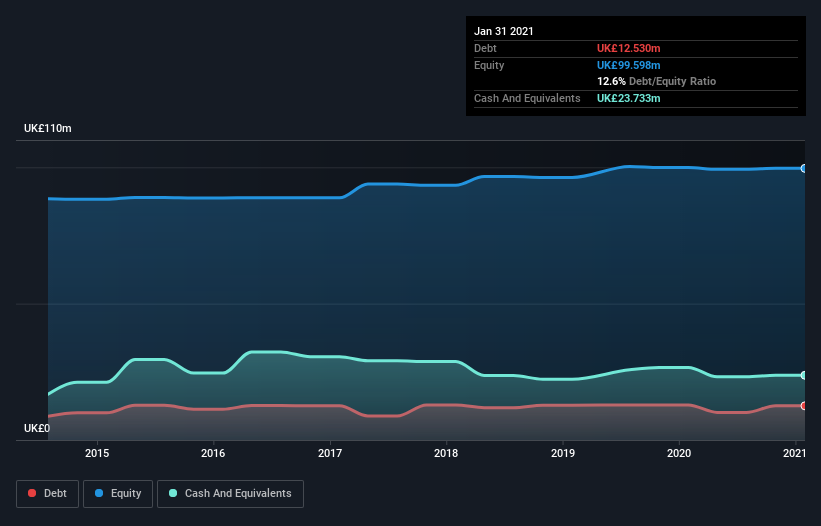- United Kingdom
- /
- Construction
- /
- LSE:SMJ
Here's Why J. Smart (Contractors) (LON:SMJ) Can Manage Its Debt Responsibly

David Iben put it well when he said, 'Volatility is not a risk we care about. What we care about is avoiding the permanent loss of capital.' So it might be obvious that you need to consider debt, when you think about how risky any given stock is, because too much debt can sink a company. Importantly, J. Smart & Co. (Contractors) PLC (LON:SMJ) does carry debt. But the real question is whether this debt is making the company risky.
When Is Debt Dangerous?
Debt is a tool to help businesses grow, but if a business is incapable of paying off its lenders, then it exists at their mercy. Part and parcel of capitalism is the process of 'creative destruction' where failed businesses are mercilessly liquidated by their bankers. However, a more common (but still painful) scenario is that it has to raise new equity capital at a low price, thus permanently diluting shareholders. Of course, plenty of companies use debt to fund growth, without any negative consequences. When we think about a company's use of debt, we first look at cash and debt together.
Check out our latest analysis for J. Smart (Contractors)
How Much Debt Does J. Smart (Contractors) Carry?
As you can see below, J. Smart (Contractors) had UK£12.5m of debt, at January 2021, which is about the same as the year before. You can click the chart for greater detail. But on the other hand it also has UK£23.7m in cash, leading to a UK£11.2m net cash position.

A Look At J. Smart (Contractors)'s Liabilities
The latest balance sheet data shows that J. Smart (Contractors) had liabilities of UK£15.2m due within a year, and liabilities of UK£2.55m falling due after that. On the other hand, it had cash of UK£23.7m and UK£3.32m worth of receivables due within a year. So it can boast UK£9.25m more liquid assets than total liabilities.
It's good to see that J. Smart (Contractors) has plenty of liquidity on its balance sheet, suggesting conservative management of liabilities. Given it has easily adequate short term liquidity, we don't think it will have any issues with its lenders. Simply put, the fact that J. Smart (Contractors) has more cash than debt is arguably a good indication that it can manage its debt safely.
In fact J. Smart (Contractors)'s saving grace is its low debt levels, because its EBIT has tanked 23% in the last twelve months. When a company sees its earnings tank, it can sometimes find its relationships with its lenders turn sour. The balance sheet is clearly the area to focus on when you are analysing debt. But you can't view debt in total isolation; since J. Smart (Contractors) will need earnings to service that debt. So if you're keen to discover more about its earnings, it might be worth checking out this graph of its long term earnings trend.
Finally, a business needs free cash flow to pay off debt; accounting profits just don't cut it. While J. Smart (Contractors) has net cash on its balance sheet, it's still worth taking a look at its ability to convert earnings before interest and tax (EBIT) to free cash flow, to help us understand how quickly it is building (or eroding) that cash balance. Over the most recent three years, J. Smart (Contractors) recorded free cash flow worth 74% of its EBIT, which is around normal, given free cash flow excludes interest and tax. This cold hard cash means it can reduce its debt when it wants to.
Summing up
While we empathize with investors who find debt concerning, you should keep in mind that J. Smart (Contractors) has net cash of UK£11.2m, as well as more liquid assets than liabilities. And it impressed us with free cash flow of UK£2.0m, being 74% of its EBIT. So we are not troubled with J. Smart (Contractors)'s debt use. The balance sheet is clearly the area to focus on when you are analysing debt. However, not all investment risk resides within the balance sheet - far from it. For example, we've discovered 2 warning signs for J. Smart (Contractors) that you should be aware of before investing here.
At the end of the day, it's often better to focus on companies that are free from net debt. You can access our special list of such companies (all with a track record of profit growth). It's free.
If you decide to trade J. Smart (Contractors), use the lowest-cost* platform that is rated #1 Overall by Barron’s, Interactive Brokers. Trade stocks, options, futures, forex, bonds and funds on 135 markets, all from a single integrated account. Promoted
New: Manage All Your Stock Portfolios in One Place
We've created the ultimate portfolio companion for stock investors, and it's free.
• Connect an unlimited number of Portfolios and see your total in one currency
• Be alerted to new Warning Signs or Risks via email or mobile
• Track the Fair Value of your stocks
This article by Simply Wall St is general in nature. It does not constitute a recommendation to buy or sell any stock, and does not take account of your objectives, or your financial situation. We aim to bring you long-term focused analysis driven by fundamental data. Note that our analysis may not factor in the latest price-sensitive company announcements or qualitative material. Simply Wall St has no position in any stocks mentioned.
*Interactive Brokers Rated Lowest Cost Broker by StockBrokers.com Annual Online Review 2020
Have feedback on this article? Concerned about the content? Get in touch with us directly. Alternatively, email editorial-team (at) simplywallst.com.
About LSE:SMJ
J. Smart (Contractors)
Engages in the contracting, developing, and constructing public works, shopping centers, offices, factories, warehouses, local authority, and landlords and private housing projects in the United Kingdom.
Excellent balance sheet average dividend payer.
Market Insights
Community Narratives



